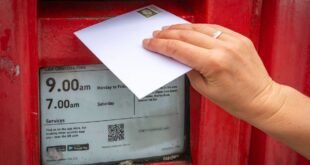Britain faces “extraordinary disruption” at its borders and crucial government services grinding to a halt if planned public sector strikes go ahead.
Some 100,000 civil servants in the Public and Commercial Services (PCS) union have voted to strike this winter in a dispute over pay, meaning disruption at airports and key ports like Dover, logjams in issuing passports and driving licences, and potential delays to benefit payments if strikes go ahead.
It comes as the government dismissed the Royal College of Nursing’s demand of a 17.6 per cent pay rise as “unreasonable”, after the union announced its first nationwide strike in its 106-year history on Wednesday.
Rishi Sunak has been warned of a “winter of strike chaos” and urged to intervene and order his ministers to negotiate over pay, conditions and jobs.
Labour called on the government to stop “running away” from talks with union bosses, with strikes now looming in the NHS, civil service, transport sector, universities and Royal Mail.
The Liberal Democrats said it was time for Mr Sunak to convene a special “strike summit” with union chiefs at Downing Street, as well as asking ministers to play a more active role in forging agreements.
Christine Jardine, the Lib Dems’ Cabinet Office spokesperson, told The Independent: “Britain seems to be lurching from crisis to crisis, strike after strike, because there is a leadership vacuum in government.”
She added: “A winter of strike chaos needs to be avoided and that starts with the government getting a grip of the situation. There should be a strike summit held in No 10 to be chaired by the prime minister.”
TUC general secretary Frances O’Grady told The Independent that Mr Sunak “should be getting around the table with unions to deal with Britain’s cost of living emergency”.
Ministers have continued to point to the role of independent pay review bodies in recommending pay rises – but Ms O’Grady said it was ministers who ultimately make the decisions to “hold down the wages” of millions of public sector workers.
“If there is large-scale strike action over the months ahead, the government only has itself to blame,” said the union leader.
Around 120,000 PCS union members in more than 120 government departments and public bodies voted for strike action on Thursday – including staff at the Department at Work of Pensions (DWP) and Department of Health and Social Care (DHSC).
Calling for a 10 per cent pay hike in line with inflation, the union said that unless it received “substantial proposals” from the government, it would announce a programme of “sustained” strikes next Friday.
PCS general secretary Mark Serwotka warned that strikes would be aimed at putting “maximum pressure” on the government and the PCS would also discuss coordinated action with other unions this winter.
Amid fears of delays to benefits, he said striking DWP staff would do their best to avoid “disrupting” payments. “We certainly have no intention of wanting to be in a position of disrupting those people who are on welfare who are getting payments,” he said.
But he warned that strikes among staff at the Department of Environment, Food and Rural Affairs (Defra) could disrupt payments to farmers, while striking Cabinet Office officials could jeopardise “security vetting and IT processes” across government.
Asked by The Independent if Mr Sunak and ministers should intervene to resolve the pay issue, Mr Serwotka said: “The only way this can be resolved is if political decisions are made to loosen the purse strings – there has to be ministerial involvement.”
The PCS leader said some civil servants on low pay had been forced to turn to handouts to avoid hunger – revealing that food banks had been set up at the Department for Business Energy and Industrial Strategy (BEIS), GCHQ and other government offices.
“Poverty is everywhere in the civil service. Food banks for civil servants tells us that pay is chronically low and an urgent intervention by government is needed,” he said.
At least 177 NHS organisations across England, Wales, Scotland and Northern Ireland will be hit when nurses take to the picket lines following an unprecedented vote over action for more pay.
On Thursday, health secretary Steve Barclay held “cordial” talks with RCN general secretary Pat Cullen, but it is understood that the health secretary refused to negotiate over pay.
Ms Cullen told The Independent: “Politicians have the power to stop this now and at any point. The prime minister should be encouraging ministers to hold detailed discussions – our door is open.”
Labour leader Sir Keir Starmer said it was vital to “get the government round the negotiating table”. Sir Keir told BBC Radio Humberside he supports the “right” of the nurses to strike, but refused to commit to above-inflation pay rises if he was in No 10.
Aslef announced on Thursday that train drivers at 12 operators will strike on 26 November, threatening more travel chaos across the country. The union described it as a “last resort” and said it still waiting for a suitable pay offer.
It comes as commuters in London endured travel chaos on Thursday, as nine of 11 tube lines closed during a 24-hour strike by RMT and Unite members on the London Underground.
Rail minister Huw Merriman claimed on Thursday that the Sunak government has “changed the tone” on train strikes that have decimated services in recent months.
Asked if he planned to hold talks with the union leaders, Mr Merriman told an industry conference that negotiations remained between Network Rail, the operators and the unions, but added: “We stand by willing to aid in any particular way.”
Widespread train strikes due to take place this week were called off by the RMT, which said it would enter “intensive negotiations” with Network Rail, but warned it could still take further action in the months ahead.
Unison is balloting 350,000 of its members in the NHS – from paramedics to cleaners – on strike action over pay this winter, while Unite is balloting around 100,000 NHS staff, including emergency responders and nursing staff.
The University and College Union (UCU) is holding strike action on 24, 25 and 30 November, while Heathrow Airport staff are striking from 18 to 21 November – potentially disrupting fans heading to the World Cup in Qatar.
Source link



